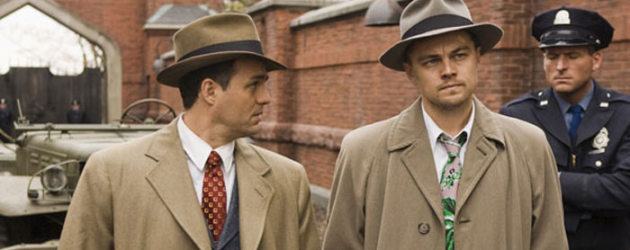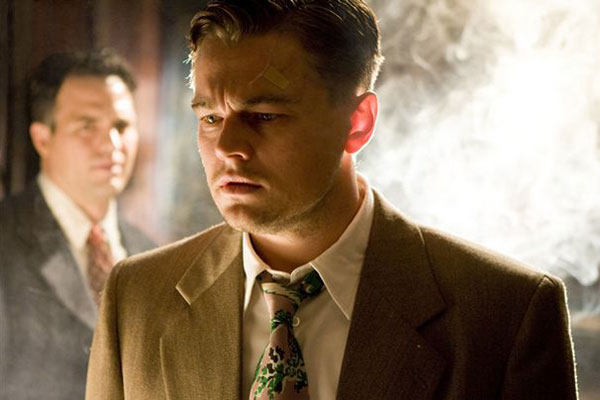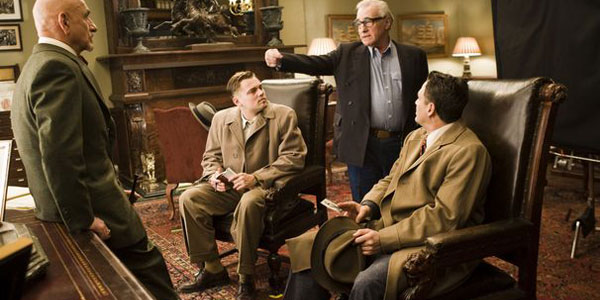.
.
SHUTTER ISLAND
Review by Steve Friedel
With more than a slight wink & nod to the master of suspense (that’d be Alfred Hitchcock), the master of pretty much all of modern filmmaking — Martin Scorsese (The Departed) — has made one hell of an attempt at psychological…er… thrill-ology. It doesn’t always work (though I can’t discuss why until AFTER you’ve seen it) — and it was a risky venture to begin with — but Shutter Island, especially with a solid, emotionally-charged performance by Leo DiCaprio (Body of Lies) at its center, will undoubtedly transport you back to the glory days of the film noir and mystery (minus the black-and-white picture, of course).
It’s 1954. U.S. Deputy Marshall Edward “Teddy” Daniels (DiCaprio) and his new partner Chuck Aule (Mark Ruffalo, Blindness) are dispatched to an insane asylum on a small island off the coast of Boston after one of the hospital’s most dangerous female patients — for having drowned her three children — has disappeared. And not just disappeared; the very intelligent Rachel Solando (Emily Mortimer, Redbelt) — as it’s been described by facility head Dr. Cawley (Ben Kingsley, Fifty Dead Men Walking) — vanished into thin air after being locked in her cell for the night.
But we find out early on that Teddy wasn’t given the case simply by chance; he has a research-fueled reason to suspect the patients are being used as guinea pigs in experiments remniscent of Nazi Germany — the results of which he has first-hand knowledge due to his army unit’s liberation of a concentration camp in WW2 — and potentially is a massive government conspiracy he aims to shut down. But his ultimate goal is upset by intense migraines, hallucinations from a tortured past — his wife Dolores (Michelle Williams, Wendy and Lucy) died in an apartment fire– a monstrous hurricane, uncooperative staff members, and a secret Teddy’s reluctant to divulge — even to his partner — for fear it could severely side-track his savior mission. And though this is a relatively short synopsis, there is a purpose for this… and I’ll write no more about the plot.
DiCaprio continues to grow as an actor and buck the trend that he’s not quite as accomplished as his contemporaries; I beg to disagree. In spite of Teddy’s steadfast resolve to put an end to the suffering around him, he’s inwardly suffering something fierce. Dicaprio brings the bull-headed intensity of the central figure in charge while showing a convincing, necessary degree of vulnerability, desperation, and sadness that will become all too clear; it’s a terrific, adult turn. Ruffalo is also quite good as wingman cop Chuck, guiding Teddy’s ill-tempered (though well-meaning) intentions to a better conclusion (at least until Chuck winds up missing). Other honrable mentions would have to go to a dynamic supporting cast, including Kingsley, Williams, Mortimer, Max von Sydow’s (Minority Report) Dr. Naehring (one of Dr. Cawley’s colleagues with questionable aims), and Patricia Clarkson (Vicky Cristina Barcelona) and Jackie Earle Haley (Watchmen) as two of Teddy’s most important encounters with more than a few epiphanies for the wayward marshall.
Understand that though it has been described (and inaccurately advertised) as such, Shutter Island is not a horror film. It’s true there are plenty of dark and creepy moments, but Scorsese’s not out for sudden scares (though it might appear elsewise) nor supernatural bumps in the night — surely you know by now that’s just not his style (and he’s not out to recreate that style). No, this is pure “slow burn” (something he IS quite capable of); you can almost feel the tension mount and the screw turn as the story takes shape — and trust me, it’s a story that’s got more depth, twists, master strokes, and just plain moments of “huh?” that’ll have you talking long after the credits. Like I said, there is a definite Hitchcockian flavor to the proceedings with shades of North by Northwest, Rear Window, and Vertigo. Hell, there’s even a quick homage to the shower scene in Psycho (but blink and you’ll miss it). Who better to continue the genre?
What may be even more astounding — and what certainly lends to the Hitchcock air — is the virtual 1950s environment Scorsese’s crew has created here. You can’t have a successful noir thriller without the genuine look of one, and Scorsese’s well aware of this in his presentation of setting, cinematography, even music — a dour, exaggerated dirge of loud horns and pounding drums created by the director and his music supervisor, Robbie Robertson (whom Scorsese worked with previously on Gangs of New York and Casino).
This may not be one of Scorsese’s finest — and could very well (but shouldn’t) be written off as just another “experiment” — that’s as good as some of the best films of 2009; that’s unfortunate, in that it was due to be released late last year, smack-dab in the middle of Oscar season. For a thriller that MORE than thrills — and made by some of the most respected folks in Hollywood — it, at the very least, should be appreciated. For me, I have to applaud it as being so much more.
.
.
SHUTTER ISLAND
Review by Gary Murray
Martin Scorsese is arguably the greatest living director. For four decades, his films read as a litany of film school must-see works of cinematic art. After a number of nominations, his movie THE DEPARTED was granted Oscar gold. But he should have won many times before that. His latest is SHUTTER ISLAND.
The film opens with choppy storm seas, black fog and choppy editing. Teddy Daniels (Leonardo DiCaprio) and Chuck Aule (Mark Ruffalo) are U.S. Marshals sent to Boston’s Shutter Island Ashecliffe Hospital to investigate a missing person. Our first images of Teddy have him as pale white, seasick from the rough waves. Chuck is his new partner, a person that Teddy knows nothing about.
The time is 1954 and psychiatry is in a transition phase. Where Dr Cawley (Ben Kingsley) believes that the individual can be helped by the patient working out his problems through confrontation, his counterpart Dr. Naehring (Max von Sydow) is more of an old school guy – relying on lobotomies to keep hard core patients quiet. It doesn’t help that Dr. Naehring is a former Nazi, and Teddy freed prisoners from the concentration camps. The island facility where the two are sent has three parts; an Ward A and a Ward B for less severe cases, with a Ward C for the desperately criminally insane – those who are dangerous and damaged.
We soon find out that Teddy has some major issues from his past. WWII with the high body count haunts his dreams, as do visions of his wife (Michelle Williams) who died in a mysterious fire. He has horrible dreams of her sometimes collapsing in ash and smoke. It is just one of many perfectly executed visuals.
The film is about the investigation of the missing person, a woman who just disappeared from the island. But as Teddy questions the insane people, he begins to wonder exactly who on the island is insane. Some of the techniques used by the staff seem both criminal and torturous, to the point of being illegal and unethical. It seems that everyone is rehearsed in their answers. One woman slips Teddy a note with one word on it, “RUN”. In the cell of the missing woman, he finds another note that reads “The law of 4” and “Who is 67?” There are only 66 inmates on Shutter Island.
This leads to sneaking into the restricted Ward C and a confrontation with an inmate (Jackie Earle Haley) huddled in a corner. The inmate seems to know Teddy and fears for him. We then learn of a lighthouse and even more clues about what is truly going on. The bulk of SHUTTER ISLAND is of the physical storm that hits the island and the emotional storm that hits Teddy.
Martin Scorsese can tell a tale, spinning a solid web of tragedy within the confines of a mystery. There is this epic degree of sadness that tries to pull the story into horrible depths, but at that drowning moment it bobs back to the surface. This is a masterfully told tale done by one of the best in the business.
But there are also some major problems with SHUTTER ISLAND. At nearly 2½ hours, it is way too long. The screenplay gives us so much that the surprise ending is not much of a surprise. In so many ways it reminded me of the very old silent classic THE CABINET OF DR. CALIGARI with equal parts tone and style. The German expressionistic film set the stage for both horror and Hitchcock, while still being one of the most important films of the pre-sound era.
Leonardo DiCaprio is brilliant in his role as Teddy. He delivers every emotion in the actors toolbox as he brings the character to tragic life. This is an Oscar-caliber performance, better than half of the nominees for the 2009 Academy contention.
Once again Jackie Earle Haley delivers maximum performance in basically a one scene role. He sends chills down the spine as a man trapped in Ward C. I am starting to believe that this former child star is one of the best unsung character actors in Hollywood.
Those expecting a horror film or a big action piece may be unpleasantly surprised by SHUTTER ISLAND. It wears its horror and its action in the mind and not on the screen.










